TODAY’S READING FROM THE OLD TESTAMENT- 2 CHRONICLES 21:1-23:21
After Jehoshaphat’s death, his eldest son, Jehoram, inherits Judah’s throne. 
Despite being a descendant of the house of David, Jehoram proves that his allegiance is more towards the house of Ahab. Although he is the King of Judah, he “walks in the ways of the kings of Israel” and adopts their idolatry. He turns his people’s hearts away from the worship of the one true God with whom they were in a covenant relationship. He caused the nation to commit spiritual adultery. This is due predominantly to the influence of his wife, Athaliah, who was the daughter of Ahab and Jezebel.
God sees Jehoram’s prideful apostacy and chastises him for it. His jurisdiction over his kingdom would unravel as Edom and Libnah would break away and form their own governments.
The prophet Elijah calls out the sins of Jehoram. He is responsible for the murder of his brothers and the spiritual adultery of Judah. Elijah declares that the Lord will strike his people with a heavy blow with the attack of the Philistines and Arabs. His goods would be plundered, and his family members taken away, with the exception of his youngest son, Ahaziah. He is also told that he would suffer and die from a painful disease of the intestinal tract.
Elijah’s prophecy comes true. After an eight-year reign, Jehoram dies of the predicted disease. In all his attempts to build a kingdom for himself, he dies with no honor, and to no one’s regret (21:20). He is buried in the city of David but is not honored by being buried in the tomb of the house of David (the Davidic kings).
Ahaziah, the youngest son of Jehoram and Athaliah, is made king in Jehoram’s place. He is 22 years old and only reigns for one year. He follows the counsel of advisors from the house of Ahab, including his mother, who was Ahab’s daughter. He is advised to join Joram, the king of Israel, the son of Ahab, in a war against Hazael, king of Aram at Ramoth Gilead. Joram suffers a fatal wound in the battle at Ramoth-Gilead, just as his father Ahab had earlier. Ahaziah goes to meet the stricken Joram at Jezreel where he had gone to recover.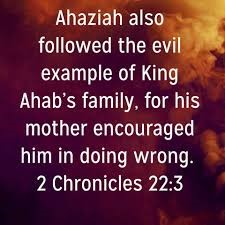
Jehu, who had been anointed by the Lord to execute judgment on the house of Ahab, kills Joram as well as the princes of Judah and some of Ahaziah’s relatives. Ahaziah escapes to Samaria but is taken captive there and brought to Jehu to be put to death.
There was no descendant of Ahaziah presumed strong enough to take the throne of Judah. Therefore, Athaliah, Ahaziah’s mother, does a power grab, destroying all possible competitors among her relatives in the house of Judah. She usurps the throne, becoming the only female ruler in the history of the house of David.
Jehosheba, the wife of Jehoiada, the priest in charge of the temple, hides Ahaziah’s young child, Joash, in the temple, before anyone had a chance to kill him under Ahathaliah’s orders.
Athaliah reigns for six years, not knowing that her grandson, Joash, whom she presumed dead, remains hidden away in the temple by her deceased son’s sister, Jehosheba.
Jehosheba’s husband, the priest Jehoiada, plots a strategic alliance with five commanders of military units, Levites, and heads of Israelite families from all the towns.
Jehoiada deploys them to both defend all the federal buildings (the Palace and the Sur Gate, known as the Foundation Gate) and the temple from Athaliah’s supporters. He also orders the Levites to protect and be ready to receive the rightful heir to the throne, the young king Joash, as he emerges from inside the temple of God, where he has been hidden and raised.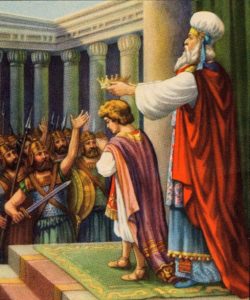
Jehoiada states his intention: “Behold, the king’s son shall reign, as the Lord has spoken concerning the sons of David” (2 Chronicles 23:3).
God had promised that He would give a lamp to David and his sons. Jesus would be the fulfillment of this prophecy long after the Davidic kings no longer sat on the throne.
Joash is crowned as King and given a copy of the Law of God (‘the testimony’) as prescribed by the Torah (Deuteronomy 17:18-20).
When Athaliah hears the crowds shouting, “Long live the king!” she enters the house of the Lord and sees the King standing by the pillar at the entrance of the Temple. This is a prophetic picture of the coming Son of David who will reign forever. Athaliah sees him that she thought dead, standing alive and crowned standing before the temple’s pillar. Which pillar? Was it the pillar named ‘Jachin’, meaning “He will establish”? Or was it the pillar named Boaz, meaning, ‘in Him is strength’? Either one is prophetically accurate. The forgotten son of David, the rightful heir to the throne, thought dead, is alive. The One Who is the temple of God, ‘He will establish” His coronation. And “In Him is strength!”
The murderous mother, Athaliah, sees she has been dethroned and defeated. She cries, “Treason! Treason!”. She is seized and taken out of the temple, lest it be defiled. She is executed at the entrance of the Horse Gate to the king’s palace.
Jehoiada, the priest, the mediator, makes a covenant with the people that they would be the Lord’s people. The pagan altars and the house of Baal is torn down and Mattan, the priest of Baal, is killed. He orders that the house of the Lord be supervised by the Levitical priests. This reform, according to that which was prescribed in the tabernacle of David, is a picture of the worship in spirit and in truth that Jesus prophesied (John 4:24) and foreshadows the kingdom of God. The King is brought down from the house of the Lord to rule upon the Throne of David (2 Chronicles 23:20).
2 Chronicles 23:21 21 So all of the people of the land rejoiced and the city was quiet. For they had put Athaliah to death with the sword.
TODAY’S READING FROM THE NEW TESTAMENT – ROMANS 11:13-36
Paul has been describing how God has sovereignly used Israel’s overall rejection of the Messiah to bring the gospel to the Gentiles. Yet God was not finished with Israel. The acceptance of the Messiah by Gentiles is designed redemptively to make Israel jealous for a personal relationship with God. This is the Apostle’s hope. God has not rejected Israel, although by and large they have rejected Him.
Prophecies in the Old Testament make it clear that Gentiles will share in the Kingdom with Israel (Isaiah 11 and 60). Jesus taught this (Luke 22:30) and it is also indicated in the Book of Revelation (Revelation 7:4; 21:12).
God promised that Gentiles would be saved (Hosea 2:23; Hosea 1:10; Romans 9:25). Paul is convinced that God’s promise for Israel will be fulfilled also.
Paul uses an analogy where he equates God’s promise given to Abraham, the promise of salvation through faith in Christ, as ‘the root’. The original branches represent those who put their faith in the promise, the sons of Abraham, believers of Israel. Where some of Israel did not believe, they are not true Israel, and are represented as branches broken off. The Jews were privileged in being part of God’s story of redemption, experiencing His deliverance, guidance, revelation through the Law of Moses. Therefore, they were part of the cultivated olive tree.
Gentiles should be humbled that they, who were outside the covenant, and therefore branches from a wild olive tree, have been blessed with inclusion into the original olive tree. They have been grafted into the promise given to Abraham. However, they should be warned by the example of Israel’s sin and hardening of heart through unbelief, and not presume that they are immune to apostacy. They should consider that the kindness of the Lord is extending to them the offer of salvation. But they should also consider the severity of the Lord towards those who prove to be only superficially rooted, and therefore are to be broken away. They should recognize God’s kindness in welcoming Jews back into the fold, and they too should be kind in welcoming them. Afterall they are the natural branches of a cultivated tree. Salvation is of the Jews. The gospel is to the Jew first. They were groomed with the Promise, whereas the Gentiles are wild branches grafted into the Promise. In both cases, both Jews and Gentiles are grafted into God’s promise of salvation by grace.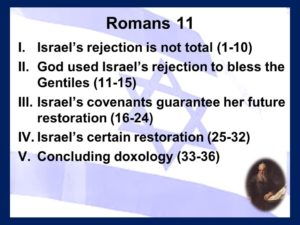
Paul reminds the Gentiles of the mystery of God’s choice (election) to use Israel. God is making known to them His hidden wisdom. The hardening that has come upon Israel has meant the gospel going to the Gentiles. But ethnic Israel’s hardening is partial and temporal until the fulness of the Gentiles comes in (11:25). There is a coming ‘day’ when “all Israel will be saved”. This does not mean that every Jew will trust Christ as Messiah, but it means that ethnic Israel as a whole, that is, by and large, will be saved (Romans 11:26-27; Isaiah 59:20).
Zechariah 13:1 1 “In that day a fountain will be opened for the house of David and for the inhabitants of Jerusalem, for sin and for impurity.
Zechariah 12:10 10 “I will pour out on the house of David and on the inhabitants of Jerusalem, the Spirit of grace and of supplication, so that they will look on Me whom they have pierced; and they will mourn for Him, as one mourns for an only son, and they will weep bitterly over Him like the bitter weeping over a firstborn.
Isaiah 59:20 20 “A Redeemer will come to Zion, and to those who turn from transgression in Jacob,” declares the LORD.
God still has a plan to use and bless ethnic Israel. “The gifts and calling of God are irrevocable,” referring to the privileges given to Israel in the history of redemption as previously described in Romans 9:4-5:
Romans 9:4-5 4 to whom (the Israelites) belongs the adoption as sons, and the glory and the covenants and the giving of the Law and the temple service and the promises, 5 whose are the fathers, and from whom is the Christ according to the flesh, who is over all, God blessed forever. Amen.
This chapter concludes with a doxology celebrating the sovereign mercy of God offered to Jews and Gentiles in salvation.
Romans 11:33-36 33 Oh, the depth of the riches both of the wisdom and knowledge of God! How unsearchable are His judgments and unfathomable His ways! 34 For WHO HAS KNOWN THE MIND OF THE LORD, OR WHO BECAME HIS COUNSELOR? 35 Or WHO HAS FIRST GIVEN TO HIM THAT IT MIGHT BE PAID BACK TO HIM AGAIN? 36 For from Him and through Him and to Him are all things. To Him be the glory forever. Amen.
TODAY’S READING FROM THE BOOK OF PSALMS- PSALMS 22:1-18
Psalms 22 to 24 form a trilogy depicting the Messiah as our Shepherd King. In Psalm 22 the Shepherd King lays down His life for the sheep. In Psalm 23 we see how the Shepherd King provides for His sheep. In Psalm 24 the Great Shepherd of the Sheep returns to reign over His sheep and reward them.
This Psalm contains references to David’s suffering. We do not know the circumstance. But in the description, we see a prophetic picture of the suffering of Christ, the Son of David.
The prayer of Christ on the cross is found in the first verse: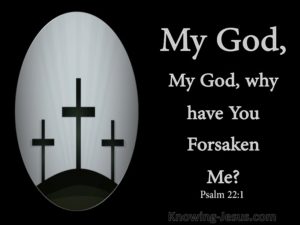
Psalm 22:1a 1 My God, my God, why have You forsaken me? (See Matthew 27:46; Mark 15:34)
Jesus identifies with the sinner on the cross and senses what that separation feels like, although He and the Father are one in essence. (Isaiah 59:2). The holiness of God demands that sin be punished. Jesus was willing to take that punishment our sin deserved on his own body.
“I am a worm and not a man” This is a picture of the humiliation of Christ. A worm is a creature of the ground. God created man to be more than a creature of the ground. He was created to be a coregent with Christ, a heavenly man. But Jesus identifies with man in his fallen state on the cross, yet without sin. He who knew no sin became sin (2 Corinthians 5:21).
Verse 7 and 8 sound like eye-witnesses of the crucified Christ one thousand years in the future.
Psalm 22:7-8 7 All who see me sneer at me; They separate with the lip, they wag the head, saying, 8 “Commit yourself to the LORD; let Him deliver him; Let Him rescue him, because He delights in him.”
Verses 12 and 13 remind us of the demonic oppression that Jesus must have experienced.
Verses 16 and 17 picture the human tormentors who mocked Him.
Verse 18 accurately predicts the activity of those Roman soldiers who gambled for Jesus’ robe.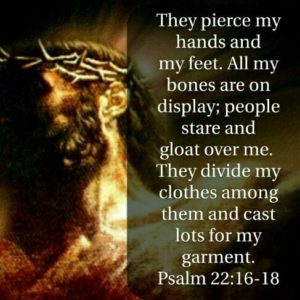
Psalm 22:18 18 They divide my garments among them, and for my clothing they cast lots.
Verses 22-31 contain magnificent declarations of faith in the repercussions of Christ’s accomplishment in His atoning death.
We experience His presence as our resurrected Head who is not ashamed to call us His brothers.
Psalm 22:22 22 I will tell of Your name to my brethren; In the midst of the assembly I will praise You.
Jesus said to Mary on that Resurrection Day, “I am ascending to my Father and your father, to my God and your God (John 20:17).
The Psalm closes with the Shepherd King experiencing the rewards of His suffering (v. 25-31).
TODAY’S READING FROM THE BOOK OF PROVERBS- PROVERBS 20:7
Proverbs 20:7 7 A righteous man who walks in his integrity— How blessed are his sons after him.
What a blessing it is for children to have the example of godly parents! A believer who walks with the Lord in integrity will inspire his or her children to pursue the same kind of relationship. May we reproduce after His kind by nurturing the next generation with spiritual authenticity.
PRAY FOR THE NATIONS – JORDAN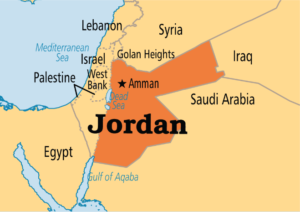
Jordan
Hashemite Kingdom of Jordan
Asia
Geography
Area: 89,206 sq. km
Lies on the eastern bank of the Jordan River. Agriculture and population are concentrated near the river. Most of the country is desert.
Population: 6,472,392 Annual Growth: 3.06%
Capital: Amman
Urbanites: 78.5%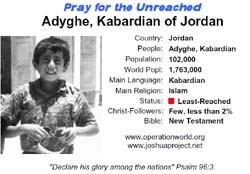
HDI Rank: 96 of 182 (UN Human Development Reports 2009)
Peoples
Peoples: 21 (67% unreached) All peoples
Unreached Peoples Prayer Card
Official language: Arabic Languages: 16 All languages
Religion
Largest Religion: Muslim
|
Religion |
|
Pop % |
Ann Gr |
|
144,982 |
2.24 |
0.4 |
|
|
19,116 |
0.3 |
3.3 |
|
|
Muslim |
6,243,917 |
96.47 |
|
Challenges for Prayer
Religious freedom could be a casualty amid rising religious tensions. This nation is a center for many Christian activities and ministries, and much Christian work in the Middle East would suffer were a setback to occur in Jordan. A number of converts find life difficult – pressure comes from family, work and society. Emigration is often seen as an obvious and safe option. Pray for the freedom to proclaim the gospel and for followers of Jesus to be able to remain in Jordan.
Ministry opportunities for foreign Christians are under threat, but remain important. A crackdown on Islamist extremism resulted in some Christian ministries being shut down and visas denied. Several agencies are involved in a wide range of activities, usually supporting and enhancing the national Church and meeting humanitarian needs. Jordan also hosts a language school wherein many learn Arabic for their service in the Arab world. Pray that these expatriates’ lives may commend the Lord Jesus and gain witness opportunities. Pray that the well-placed Jordanian Church might experience growth in its mission vision.
PRAYER: Father, thank You for Your holy Word. The record of earthly kings and their failures highlight the perfection of Your Anointed King, our Shepherd King, our Lord and Savior Jesus Christ. We are humbled by His willingness to suffer the immeasurable wrath incurred by our sin on the cross. His confidence in Your holiness and Your righteousness inspires us to obedience and surrender. The fact that He who knew no sin, became sin that we might be constituted as righteous in Your sight causes our hearts to tremble with reverential awe. And that He would rise to be our representative interceding on our behalf, unashamed to call us His brothers and sisters, humbles us. We ask that You would help us to be conscious of His presence among us, especially when we gather as a congregation to offer praise to You. In Jesus’ Name. Amen.
